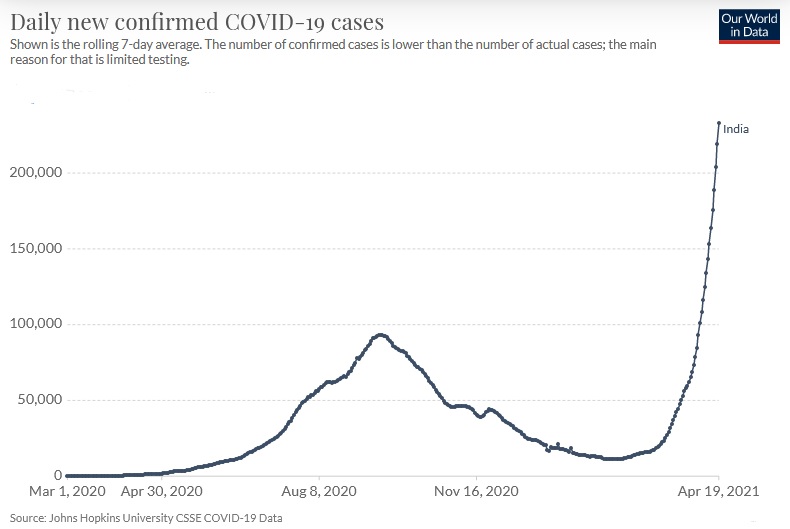
Delhi; 21 April 2021 (UMMN): On 20 Apr 2021; PTI reported 259,170 new cases and 1,761 fatalities in a day but ground witnesses tell a very different situation.
According to the official data the number of daily cases and deaths has risen sharply in the second wave that started at the beginning of March 2021. New corona cases and deaths have risen exponentially since then.
According to BBC News, crematoriums have been running day and night in several cities, and people have to wait for hours to get the deceased cremated or buried.
Experts say this shows that the actual number of deaths could be much higher.
Sanjeev Gupta, a photojournalist based in the central Indian city of Bhopal, reached one of the city's crematoriums for what he thought was a usual assignment last week.
Bhopal had reported only four Covid-related deaths on that day. But Mr Gupta was surprised to see dozens of funeral pyres burning while several bodies were lined up to be cremated in the electric furnace.
Another photojournalist in Lucknow, the capital of Uttar Pradesh state, told the BBC that he counted nearly 100 funeral pyres burning at one of the city's crematoriums in the city on 14 April. The official death data for the whole state on that day was 85.
"The sky had turned orange near the crematorium… We are definitely not getting the right death data from the government," he said.
Another photojournalist the BBC spoke to in Varanasi city in Uttar Pradesh state also talked about similar discrepancies in how deaths were being reported.
Experts say there are several reasons for this. One of them is that many people are dying at home because they are not getting hospital beds or they are not being able to get tested for Covid. So, they are not counted as a Covid patient in the database managed by different states.
Testing facilities are poor or non-existant in villages, smaller towns and even in some cities and "we are missing many Covid-related deaths in these areas" said Mr Bhan to BBC.
He adds that there seems to be an issue with recording Covid deaths in some states. There have been reports about administrative oversight as well but officials deny the allegation.
"We need more transparency in numbers as it helps in managing the situation and also clearly tells you how severe the situation is," Mr Bhan adds.
 India has been consistently reporting more than 150,000 cases for days now. It reported 273,810 cases on Monday - the biggest daily spike since the pandemic began.
India has been consistently reporting more than 150,000 cases for days now. It reported 273,810 cases on Monday - the biggest daily spike since the pandemic began.
Public health expert Anant Bhan says officials did not use the lean period to boost facilities.
"We didn't learn any lesson from the first wave. We had reports of some cities running out of beds even in the first wave and that should have been a good enough reason to be prepared for the second wave," he said.
He adds that there appears to be a lack of co-ordination between states and the federal government over the supply of oxygen and essential drugs. "We need a consolidated response and resources should be shared between states."
Experts say this rapid increase shows that the second wave is spreading much faster across the country. Dr A Fathahudeen, who is part of Kerala state's Covid taskforce, said the rise was not entirely unexpected given that India let its guard down when daily infections in January fell to fewer than 20,000 from a peak of over 90,000 in September.
Big religious gatherings, the reopening of most public places and crowded election rallies are being blamed for the uptick. Talking to BBC News, Dr Fathahudeen said there were warning signs in February but "we did not get our act together".
"I said in February that Covid had not gone anywhere and a tsunami would hit us if urgent actions were not taken. Sadly, a tsunami has indeed hit us now," he added.
"A false sense of normalcy crept in and everybody, including people and officials, did not take measures to stop the second wave." said Dr Fathahudeen.




